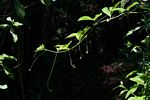| Home | > | List of families | > | Passifloraceae | > | Passiflora |
5372.000 Passiflora - Passion flowers
Description of the genus
Climbing herbs or lianes. Stipules 2 or 0. Leaves alternate, lobed or simple; petiole often with glands. Tendrils usually solitary in leaf axils, rarely 0. Flowers usually large and handsome, axillary, solitary or in racemes, bisexual, 5-merous. Bracts often 3, forming an involucre below the flower. Sepals often coloured inside, sometimes with horns on the back just below apex. Petals 5 or 0, membranous, more vividly coloured than the sepals. Corona present, variously shaped, simple or usually composed of filaments. Androgynophore usually distinct. Stamens 5, free. Styles 3. Fruit usually indehiscent, ± berry-like, spherical or ellipsoid, or rarely fusiform. The structure of the flower is described in this labelled image of Passiflora subpeltata. Species of the genus were called "Calvary Lesson" by Catholic missionaries in S America (Mabberley, 1997) and the explanation of that is also given on the same page. Worldwide: c.450 spp.species in subtropical and tropical America, Asia, Australia and Polynesia. All our species are introduced. Mozambique: 3 taxa. Insects associated with this genus:
|
 |
Links to taxa: View: living plant images - herbarium specimen images - all images for this genus
| Species | FZ divisions | Content |
| edulis Sims | MS,M | Description, Image |
| foetida L. | N,Z,M | Description, Image |
| quadrangularis L. | M |
Other sources of information about Passiflora:
Our websites:
Flora of Botswana: cultivated PassifloraFlora of Burundi: Passiflora
Flora of Caprivi: cultivated Passiflora
Flora of the DRC: Passiflora
Flora of Malawi: Passiflora
Flora of Malawi: cultivated Passiflora
Flora of Mozambique: cultivated Passiflora
Flora of Zambia: Passiflora
Flora of Zambia: cultivated Passiflora
Flora of Zimbabwe: Passiflora
Flora of Zimbabwe: cultivated Passiflora
External websites:
African Plants: A Photo Guide (Senckenberg): PassifloraBHL (Biodiversity Heritage Library): Passiflora
EOL (Encyclopedia of Life): Passiflora
GBIF (Global Biodiversity Information Facility): Passiflora
Google: Web - Images - Scholar
iNaturalist: Passiflora
IPNI (International Plant Names Index): Passiflora
JSTOR Plant Science: Passiflora
Mansfeld World Database of Agricultural and Horticultural Crops: Passiflora
Plants of the World Online: Passiflora
Tropicos: Passiflora
Wikipedia: Passiflora
| Home | > | List of families | > | Passifloraceae | > | Passiflora |